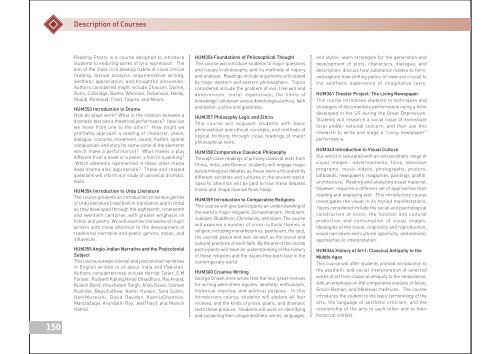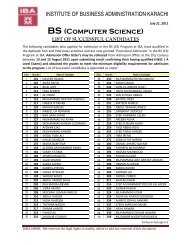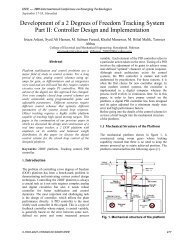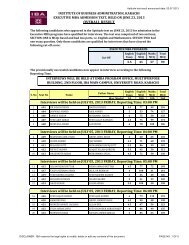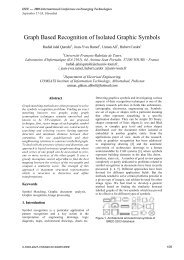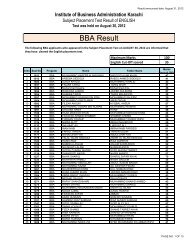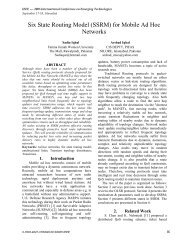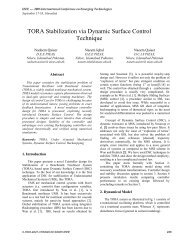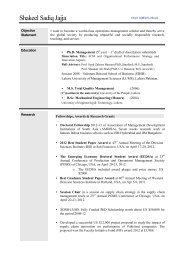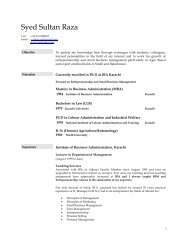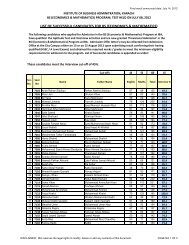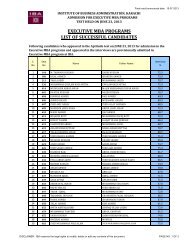Program Announcement 2013 - 14 - Institute of Business ...
Program Announcement 2013 - 14 - Institute of Business ...
Program Announcement 2013 - 14 - Institute of Business ...
Create successful ePaper yourself
Turn your PDF publications into a flip-book with our unique Google optimized e-Paper software.
Description <strong>of</strong> Courses150Reading Poetry is a course designed to introducestudents to enduring works <strong>of</strong> lyric expression. Theaim <strong>of</strong> the class is to develop habits <strong>of</strong> close criticalreading, textual analysis, argumentative writing,aesthetic appreciation, and thoughtful discussion.Authors considered might include Chaucer, Donne,Rumi, Coleridge, Basho, Whitman, Dickenson, Hardy,Ghalib, Rimbaud, Frost, Tagore, and Moore.HUM353 Introduction to DramaHow do plays work? What is the relation between adramatic text and a theatrical performance? How canwe move from one to the other? How might wepr<strong>of</strong>itably approach a reading <strong>of</strong> character, place,dialogue, costume, movement, sound, rhythm, spatialcomposition, and story (to name some <strong>of</strong> the elementswhich make a performance)? What makes a playdifferent from a novel or a poem, a film or a painting?Which elements represented in these other mediadoes drama also appropriate? These and relatedquestions will inform our study <strong>of</strong> canonical dramatictexts.HUM354 Introduction to Urdu LiteratureThe course presents an introduction to various genres<strong>of</strong> Urdu literature (read both in translation and in Urdu)as they developed through the eighteenth, nineteenthand twentieth centuries, with greater emphasis onfiction and poetry. We will examine the works <strong>of</strong> majorwriters with close attention to the development <strong>of</strong>traditional narrative and poetic genres, styles, andinfluences.HUM355 Anglo-Indian Narrative and the PostcolonialSubjectThis course surveys colonial and postcolonial narrativesin English written in or about India and Pakistan.Authors considered may include Harriet Tytler, E.MForster, Rudyard Kipling,Nirad Chaudhury, Raj Anand,Ruskin Bond, Khushwant Singh, Anita Desai, SalmanRushdie, BapsiSidhwa, Aamir Husain, Sara Suleri,HanifKureishi, David Davidar, KamilaShamsie,ManizaZaqvi, Arundathi Roy, JeetThayil, and MohsinHamid.HUM356 Foundations <strong>of</strong> Philosophical ThoughtThis course will introduce students to major questionsand issues in philosophy, and its methods <strong>of</strong> inquiryand analysis. Readings include arguments articulatedby major western and eastern philosophers. Topicsconsidered include the problem <strong>of</strong> evil; free will anddeterminism; moral imperatives; the limits <strong>of</strong>knowledge; utilitarian versus deontological ethics; faithand belief; justice and goodness.HUM357 Philosophy Logic and EthicsThis course will acquaint students with basicphilosophical and ethical concepts, and methods <strong>of</strong>logical thinking through close readings <strong>of</strong> majorphilosophical texts.HUM358 Comparative Classical PhilosophyThrough close readings <strong>of</strong> primary classical texts fromChina, India, and Greece, students will engage majorepistemological debates as these were articulated bydifferent societies and cultures in the ancient world.Specific attention will be paid to how these debatesframe and shape how we think today.HUM359 Introduction to Comparative ReligionsThis course will give participants an understanding <strong>of</strong>the world's major religions: Zoroastrianism, Hinduism,Judaism, Buddhism, Christianity, and Islam. The coursewill examine a number <strong>of</strong> cross-cultural themes inreligion, including monotheism vs. pantheism, the soul,the sacred, peace and war, as well as the social andcultural practices <strong>of</strong> each faith. By the end <strong>of</strong> the courseparticipants will have an understanding <strong>of</strong> the history<strong>of</strong> these religions and the issues they each face in thecontemporary world.HUM360 Creative WritingGeorge Orwell once wrote that the four great motivesfor writing were sheer egoism, aesthetic enthusiasm,historical impulse, and political purpose. In thisintroductory course, students will explore all fourmotives, and the kinds <strong>of</strong> prose, poetic, and dramatictexts these produce. Students will work on identifyingand sustaining their unique aesthetic voices, languages,and styles; learn strategies for the generation anddevelopment <strong>of</strong> plots, characters, dialogue, anddescription; discuss how substance relates to form;and explore how shifting points-<strong>of</strong>-view are crucial tothe aesthetic experience <strong>of</strong> imaginative texts.HUM361 Theater Project: The Living NewspaperThis course introduces students to techniques andstrategies <strong>of</strong> documentary performance using a formdeveloped in the US during the Great Depression.Students will research a social issue <strong>of</strong> immediatelocal and/or national concern, and then use thisresearch to write and stage a "living newspaper"performance.HUM363 Introduction to Visual CultureOur world is saturated with an extraordinary range <strong>of</strong>visual images: advertisements, films, televisionprograms, music videos, photographs, posters,billboards, newspapers, magazines, paintings, graffiti,architecture. Reading and analyzing visual material,however, requires a different set <strong>of</strong> approaches thanreading and analyzing text. This introductory courseinvestigates the visual in its myriad manifestations.Topics considered include the social and psychologicalconstruction <strong>of</strong> vision, the function and culturalproduction and consumption <strong>of</strong> visual images,ideologies <strong>of</strong> the visual, originality and reproduction,visual narratives and cultural specificity, and semioticapproaches to interpretation.HUM364 History <strong>of</strong> Art I: Classical Antiquity to theMiddle AgesThis course will <strong>of</strong>fer students a broad introduction tothe aesthetic and social interpretation <strong>of</strong> selectedworks <strong>of</strong> art from classical antiquity to the renaissance,with an emphasis on the comparative analysis <strong>of</strong> Asian,Greco-Roman, and Medieval traditions. The courseintroduces the student to the basic terminology <strong>of</strong> thearts, the language <strong>of</strong> aesthetic criticism, and therelationship <strong>of</strong> the arts to each other and to theirhistorical context.


